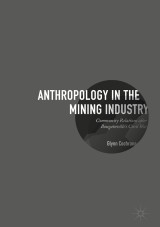Details

Anthropology in the Mining Industry
Community Relations after Bougainville's Civil War|
26,74 € |
|
| Verlag: | Palgrave Macmillan |
| Format: | |
| Veröffentl.: | 14.01.2017 |
| ISBN/EAN: | 9783319503103 |
| Sprache: | englisch |
Dieses eBook enthält ein Wasserzeichen.
Beschreibungen
<p>This book outlines how Rio Tinto—one of the world’s largest miners—redesigned and rebuilt relationships with communities after the rejection of the company during Bougainville’s Civil War. Glynn Cochrane recalls how he and colleagues utilized their training as social anthropologists to help the company to earn an industry leadership reputation and competitive business advantage by establishing the case for long-term, on the ground, smoke-in-the-eyes interaction with people in local communities around the world, despite the appeal of maximal efficiency techniques and quicker, easier answers. Instead of using ready-made, formulaic toolkits, Rio Tinto relied on community practitioners to try to accommodate local preferences and cultural differences. This volume provides a step-by-step account of how mining companies can use social anthropological and ethnographic insights to design ways of working with local communities, especially in times of upheaval. </p>
<div>1. Introduction.- 2. Bougainville lessons for Rio Tinto.-3. Panama and indigenous peoples.- 4. Miners join the UN Global Compact.- 5. Headquarters inception.- 6. A systematic approach.-7. Artisanal mining and closure.- 8. Data and forms of CSR.- 9. Resettlement.- 10. Results.- 11. Appendices.</div>
Glynn Cochrane, before his work with Rio Tinto, was Professor at the Maxwell Graduate School at Syracuse University, USA, and a World Bank staff member. He is now an adjunct faculty member at the University of Queensland, Brisbane, Australia.
This book outlines how Rio Tinto—one of the world’s largest miners— redesigned and rebuilt relationships with communities after the rejection of the company during Bougainville’s Civil War. Glynn Cochrane recalls how he and colleagues utilized their training as social anthropologists to help the company to earn an industry leadership reputation and competitive business advantage by establishing the case for long-term, on the ground, smoke-in-the-eyes interaction with people in local communities around the world, despite the appeal of maximal efficiency techniques and quicker, easier answers. Instead of using ready-made, formulaic toolkits, Rio Tinto relied on community practitioners to try to accommodate local preferences and cultural differences. This volume provides a step-by-step account of how mining companies can use social anthropological and ethnographic insights to design ways of working with local communities, especially in times of upheaval.
Presents a positive view of mining, rather than a narrow focus on corporate social responsibility Draws from varied, multidisciplinary perspectives—both inside and outside of academia Deals with the internal organization of mining companies and provides real-life case studies
<p>“Glynn Cochrane became the first professional anthropologist to work on deepening a mining company’s understanding of communities around its operations, always with the view that what was best for the community would prove ultimately to be what is best for the company. He was the pathfinder in a new outreach of anthropologists, and he has been the inspiration for many successors in the profession and for many mining companies.” (Jim Cooney, Placer Dome Inc., Originator of the concept of “social license” in the mining industry)</p>
<p>“This book provides a rich set of insights into the business of Big Mining through the eyes of a seasoned anthropologist and industry insider. Glynn offers a timely ‘shot across the bow’ to an industry that uses community relations as ‘bolt on’ function to meet corporate ends. He asks us to imagine an alternative future, where mining companies take social science, and local people, as seriously as they do other parts of the mining business.” (Deanna Kemp, Sustainable Minerals Institute, Professor at the University of Queensland, Australia)</p>
<p>“With deep personal experience of working in remote mineral-dependent communities, Glynn Cochrane, provides an authoritative ethnography of how contentious relationships between mining companies and communities have changed over time. As an academic and a practitioner, his insights offer a rare bridging narrative between the ivory tower and the mining headframe!” (Saleem H. Ali, Blue and Gold Distinguished Professor of Energy and the Environment, University of Delaware, USA)<i></i></p>
“This book forcefully underscores the differences between apparent “efficiency” and actual effectiveness. An underlying issue, of course, is the extent to which corporate decision makers actually feel any respect for local communities as equivalent human beings, or simply see them as problems to circumvent.” (Richard J. Perry, Professor of Anthropology Emeritus, St. Lawrence University, USA,and author of<i> “</i>From Time Immemorial: Indigenous Peoples and State Systems”)</p>
<p>“This book provides a rich set of insights into the business of Big Mining through the eyes of a seasoned anthropologist and industry insider. Glynn offers a timely ‘shot across the bow’ to an industry that uses community relations as ‘bolt on’ function to meet corporate ends. He asks us to imagine an alternative future, where mining companies take social science, and local people, as seriously as they do other parts of the mining business.” (Deanna Kemp, Sustainable Minerals Institute, Professor at the University of Queensland, Australia)</p>
<p>“With deep personal experience of working in remote mineral-dependent communities, Glynn Cochrane, provides an authoritative ethnography of how contentious relationships between mining companies and communities have changed over time. As an academic and a practitioner, his insights offer a rare bridging narrative between the ivory tower and the mining headframe!” (Saleem H. Ali, Blue and Gold Distinguished Professor of Energy and the Environment, University of Delaware, USA)<i></i></p>
“This book forcefully underscores the differences between apparent “efficiency” and actual effectiveness. An underlying issue, of course, is the extent to which corporate decision makers actually feel any respect for local communities as equivalent human beings, or simply see them as problems to circumvent.” (Richard J. Perry, Professor of Anthropology Emeritus, St. Lawrence University, USA,and author of<i> “</i>From Time Immemorial: Indigenous Peoples and State Systems”)</p>

















